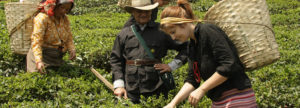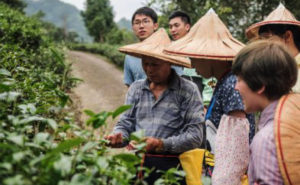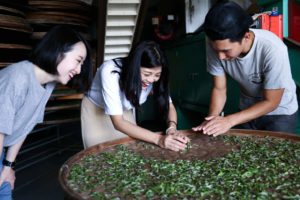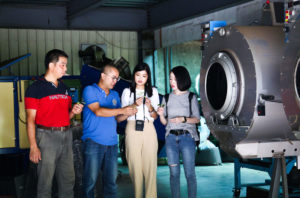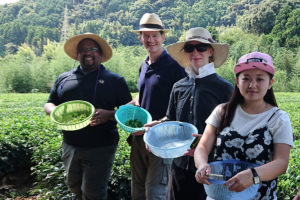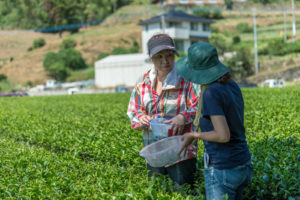Tourists seeking authentic experiences should honor the roots of cultural engagement within tea regions
Tea invokes that which we seek: peace, comfort, familiarity, or perhaps distance. As consumers, we experience the leaves’ origin, terroir, and processing within our cups. To engage more deeply, visiting tea-growing regions to learn about tea will forever alter one’s relationship with tea. But before delving into the myriad options available via tea tours, reflecting on how our actions may impact others is important. Namely, while simultaneously seeking an authentic, hands-on tea tour, one must consider which sustainable programs and respectfully engage the host culture(s).
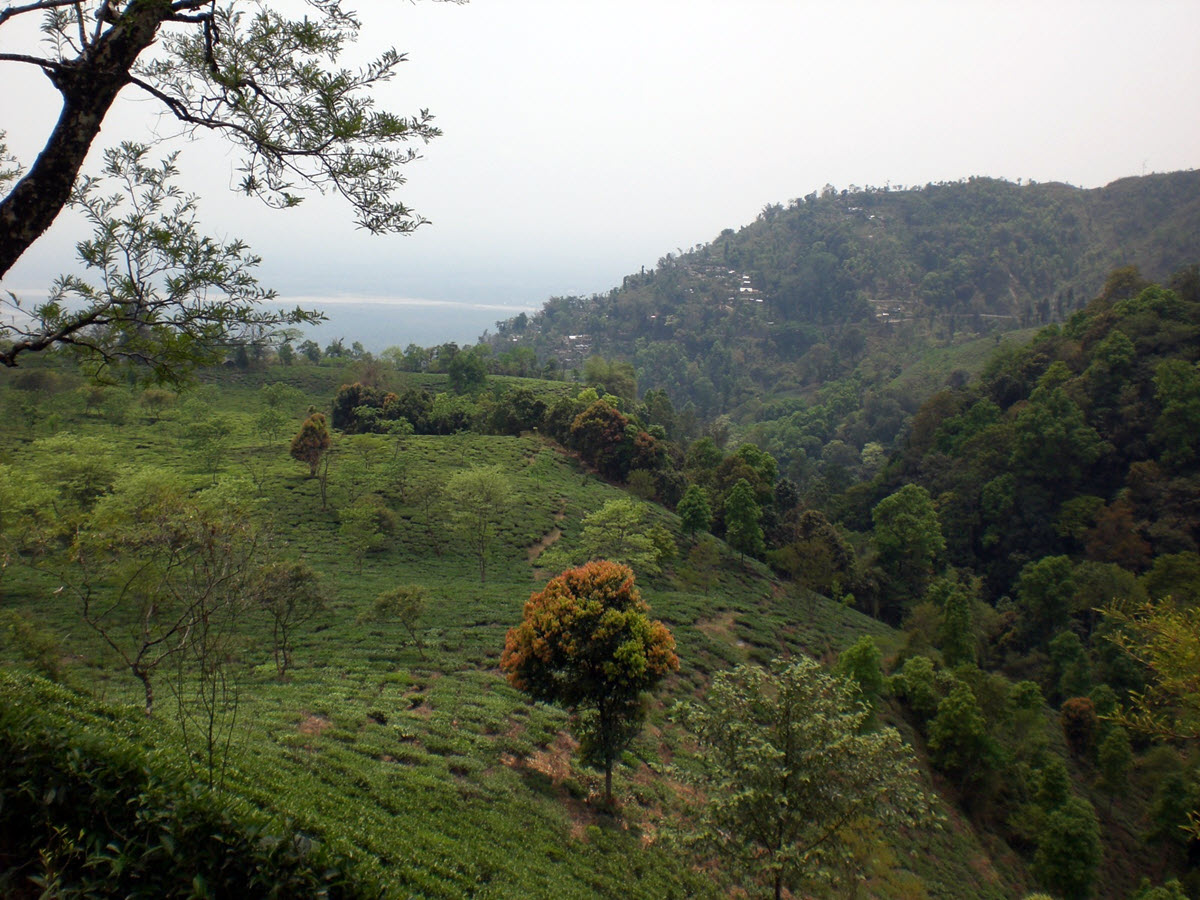
According to National Geographic, experts predict that once international travel resumes to pre-pandemic levels, a global shift will favor sustainable, inclusive, and slow explorations of communities. Across Asia, travelers have incorporated these elements historically. Sages renowned for their contributions to tea culture had traveled sustainably well before it became a greenwashed marketing strategy; they traveled slowly, integrated with the customs and cuisines of their host communities, and wrote, retreated, studied, or meditated within villages.
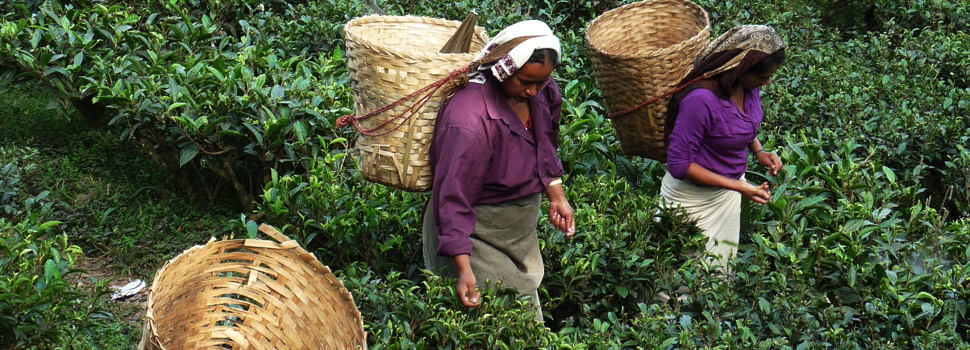
Lu Yu (733-804CE) is heralded as the tea sage. For decades before the publication of The Classic of Tea, he traveled slowly albeit extensively through Tang Dynasty China. In “Tea in China: A Religious and Cultural History,” James A. Benn records how Lu Yu lived in Wuxing in a monastery for three years, lived in Mount Mao and by Lake Tai, traversed through the modern Jiangnan region, lived on Long Shan for seven years, and built a hut in nature. Lu Yu even cultivated tea gardens in various locations to research the geographic impact on tea.
As for international exchange, Myōan Eisai (1141– 1215CE), a Buddhist priest from Japan, studied Buddhism in China for four years over two trips and returned as Japan’s first Chan (Zen) teacher. He is renowned for spreading Zen Buddhism in Japan and first bringing tea seedlings to his country, and authoring “Drinking Tea for Nourishing Life.”
Writing a book after spending years in a country to learn about the multiple intersections of its culture (literature, history, sociology, language, and tea) is not feasible for most. Still, we should consider an intersectional approach regardless of the length of stay. Although Western sustainable movements (such as the slow food movement) have emerged in recent decades as campaigns, these concepts (slow food, respectful and regenerative travel, etc) have existed for much longer in Asia. While an enhanced awareness of our socio-cultural impact is a good step, we must reflect on the variables associated with our cultural and carbon footprint. Namely, we must beware of the perils of greenwashing and ethnotourism as it relates to the tea industry.
According to a 2019 report by OxFam, “In the United States, supermarkets and tea brands are estimated to receive 93.8% of the final consumer price for bagged black tea sold in the country, while labor costs to pay workers represents just 0.8% of the final price.” This absurd inequity must not be viewed in isolation. If the final products of tea leaves or dust redistribute wages so unjustly, it is not improbable that other aspects of the trade reflect such standards. Within the tea tourism industry, we must first ask: who benefits most?
Today, several international organizations offer whirlwind tours that provide luxury or middle-class comfort tours that incorporate a particular country’s cultural sites. While these tours are intense, integrative, and informative, I wonder if we should question the merit of rapid tours. Instead of zipping through a region, how can we proceed mindfully?
Defining Sustainable Tourism
According to the United Nations World Tourism Organization, sustainable tourism should:
- “Make optimal use of environmental resources that constitute a key element in tourism development, maintaining essential ecological processes, and helping to conserve natural heritage and biodiversity.
- Respect the socio-cultural authenticity of host communities, conserve their built and living cultural heritage and traditional values, and contribute to inter-cultural understanding and tolerance.
- Ensure viable, long-term economic operations, providing socio-economic benefits to all stakeholders that are fairly distributed, including stable employment and income-earning opportunities and social services to host communities, and contributing to poverty alleviation.”
Parameters for an authentic, experiential, sustainable tea tour
Incorporating these three pillars of sustainability, the following is a list of concerns to address when evaluating an ethical, authentic, and sustainable hands-on tea tour:
Environmental sustainability
- Is the garden organic or natural? This is the first question when choosing an environmentally responsible tea tour. Pesticides and herbicides harm those working in the tea gardens and negatively impact topsoil conditions and the surrounding ecosystem. Remember that many small-scale gardens cannot afford the certificate due to its high cost; however, they may be technically organic or have naturally produced tea for far longer than those with certificates.
- What is the size of the tea garden? Parameters for small-scale tea gardens shift between countries and regions. Generally, small-scale tea gardens own less than 20 hectares of land. Small-scale terrains typically negatively impact the community more than larger estates. These are the tight-knit communities to support.
- How rich is the local biodiversity? Tea gardens are inherently agroecosystems (ecosystems that are manipulated to produce agricultural products). Though some ancient-growth tea trees (notably in Yunnan, China) are grown in the wild, most tea gardens are single-product ventures. The healthiest ecosystems will sponsor rich biodiversity: varied bird species, local mammals, indigenous plant species, etc. Coexistence is crucial.
Local Involvement
- Who are the owners, directors, and other stakeholders? Are they from the region? What reasons do they have to support the tea garden?
- How are women depicted? As in many other sectors, women are underrepresented in leadership and entrepreneurial roles within the tea industry. When looking at a program, consider the presence or absence of women, notably in leadership roles and general roles and depictions.
- What is their commitment to transparency? What are the company’s values, and how are they echoed in the website content and action?
Authentic Cultural Engagement
- What regional customs and traditions will be experienced during the tour or stay? While learning about a country’s festivals is important, learning about the specific cultures within a village and in other smaller regions is crucial.
- How are local cultures contextualized? What are local festivals that aren’t celebrated at a national level? Which local foods are served that are unlikely to be found on restaurant menus? What opportunities exist for community interaction?
- Who are the people one will engage with? Who guides the tours, hosts homestays, or demonstrates tea manufacturing processes? What are their backgrounds, be they cultural or socio-economic?
- What language learning opportunities are there? While learning a national language is important, how are the regional languages or dialects represented? What opportunities exist to learn or exchange languages?
Hands-on experience
- What involvement in the tea gardens exists? Are there slow tea tour options? Will a guest rise at dawn to pluck tea alongside the tea pluckers? What opportunities allow for engagement with tea manufacturing processes?
- How will one drink tea? Which historical or modern tea-drinking ceremonies are included? Will one experience chadao (chado), chayi, or chanoyu? Will one learn how to make chai? Furthermore, which teaware will be used? Are there any opportunities to learn about or make pottery, smash a kulhad cup, or learn how to identify the value of a Yixing teapot?
- What activities are available outside of the realm of tea? The culture of a region is far more comprehensive beyond just tea. What other ways can one engage with the host culture, such as cooking, gardening, foraging, bird watching, hiking, and via music, theatre, literature, and art?
Nepal Tea Collective
Kanchanjangha Tea Estate and Research Center, La Mandala Specialty Tea, Baraha Tea Factory, and Jasbire Tea Processing Center
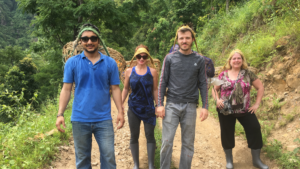
Nepal Tea Collective, based in the US, offers a unique ten-day tour that allows visitors to experience Nepali tea gardens from various perspectives. They offer their guests a chance to peek into the trade secrets, meet amazing tea farmers and producers, and taste unlimited delicious teas directly from the organic gardens lapped on the Himalayan foothills. They offer immersive experiences such as an opportunity to make personal batches of premium orthodox tea under the guidance of an experienced tea master and drink as much tea as they like with new Nepali friends! Accompanied by the founder of the Nepal Tea Collective and their local team, they take their guests to visit four tea gardens and five cities and return home with memories for a lifetime. Learn more…
Green Tea Homestay; Higashi Sonogi, Japan
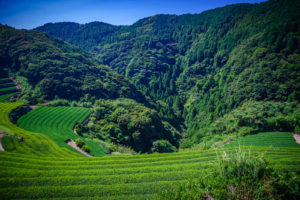
Nakao Village, nestled in Higashi Sonogi, Japan, is a rural community with a rich history of tea cultivation. Geologically, the land was originally formed by volcanic activity. Today, the average elevation is 250 meters. Tea has grown in the region for five hundred years. The Nakayama family has operated the tea factory for over 70 years and is committed to environmentally friendly practices across agricultural cultivations. They initiated an outreach program in eco-tourism in 2014. “We hope to bring visitors and overnight guests into our community not as tourists but as equals. We want to provide the hospitality that promotes the exchange of good feelings.” Learn more…
Makaibari Sustainable Tourism; West Bengal, India

The Makaibari Tea Estate is among one of the most well-known tea estates in the world. Their internationally prize-winning teas are highly appraised, and many stakeholders are none other than legends within the tea world. Although Makaibari is the site of a luxury resort, they also maintain a humble program rooted in “sustainable, responsible tourism.” Among their programs, the Makaibari Homestay Programme allows guests to live in one of the villages with a local family for long-term, short-term, or day-long visits. Learn more…
Wow Taiwan Master Tour | Blue Magpie Tour | Pinglin, Taiwan
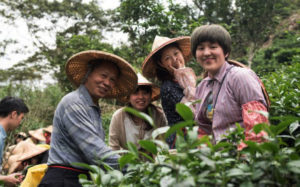
Wow, Taiwan provides half-day and day-long tours and experiential learning trips in villages across northern Taiwan. They offer several Slow Tea Tours, notably the Tea Master and Tea Mountains Culture Tour in Pinglin. “Whether sampling the local brews, making conversation with shop owners on its Old Street, or watching the sun emerge from behind its hills, Pinglin encourages visitors to slow down and bring into focus the simpler pleasures in life.” Learn more…
Mutual Benefit
Beyond the suggested tea tours, renewing our understanding of what authentic and sustainable means is important. When considering a decolonized approach to tourism, it is wise to question everything at its source. Most importantly, a responsible tourist must reflect on who benefits the most from tourism and how communities involved are integrated (or being taken advantage of).
Tea Journey endorses locally owned and operated tours encouraging a slow, mindful movement that honors the host culture.
